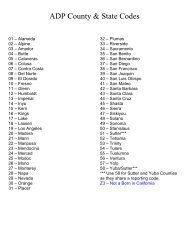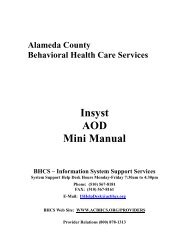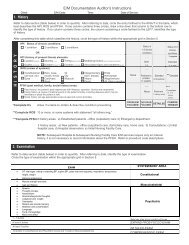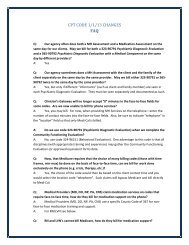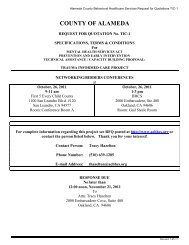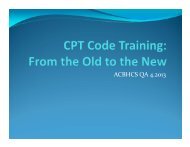Juvenile Competency Protocol - Alameda County Behavioral Health
Juvenile Competency Protocol - Alameda County Behavioral Health
Juvenile Competency Protocol - Alameda County Behavioral Health
Create successful ePaper yourself
Turn your PDF publications into a flip-book with our unique Google optimized e-Paper software.
the client, merely giving the opinion does not reveal any protected information. People v<br />
Bolden (1979) 99CA3d 375, 378. The court should avoid breaching any specific<br />
attorney-client privilege, but general questions about counsel’s observations and<br />
conversations with the minor are recommended.<br />
The court may, but is not required to, allow defense counsel to present his or her<br />
opinion regarding minor’s competency in camera if the court finds that there is a reason<br />
to believe that attorney-client privileged information will be inappropriately revealed if<br />
the hearing is conducted in open court. Cal Rules of Ct, Rule 4.130(b)(2). [Adult rule]<br />
Regional Center Assessment<br />
The court can consider whether there has previously been an assessment of<br />
competency and/or restoration of competency through the State Regional Center for<br />
persons who are developmentally disabled. Collecting past information from the<br />
Regional Center may help determine if the minor may be currently incompetent to<br />
withstand trial. W&I §709 (e) – (h)<br />
Retroactive Determination Not Required<br />
The court must only determine a minor’s current competency. Penal Code<br />
§709(a) conforms to all previous statutes and case law on this issue. It states “A minor is<br />
incompetent to proceed if he or she lacks sufficient present ability…”<br />
What Constitutes Substantial Evidence<br />
The question of what constitutes substantial evidence of a minor’s incompetence<br />
cannot be answered by a simple formula applicable to all situations. People v Laudermilk<br />
(1967) 67 C2d 272, 283. Evidence is substantial if it raises a reasonable or bona fide<br />
doubt concerning the minor’s ability to understand the nature of the juvenile proceedings<br />
against him or her, or assist in his or her defense. People v Rogers (2006) 39 C4th 826,<br />
847; People v Hayes (1999) 21 C4th 1211, 1282 (judge properly denied defendant’s<br />
motion for competency hearing). Substantial evidence is not just any evidence that<br />
supports the possible fact. Substantial evidence requires evidence that is “reasonable in<br />
nature, credible and of solid value.” Bowers v Bernards (1984) 150 Cal.App.3D 870,<br />
873. [All cases in this section are adult cases]<br />
Even if the court finds the minor to be competent, if the court suspects the minor<br />
may have a developmental disability, the court may refer the minor to the Regional<br />
Center, if deemed appropriate. (W&I §709 (e) – (h))<br />
Advise the Minor of His or Her Rights<br />
The minor needs to be advised of his/her rights concerning competency<br />
proceedings. Although in some case a minor may not have the capacity to understand<br />
his/her rights, an attempt should be made to advise each minor. If the minor does not<br />
have the capacity to understand his/her rights, the court shall nonetheless continue with<br />
the competency proceedings.<br />
10 Superior Court, <strong>Alameda</strong> <strong>County</strong>, California<br />
<strong>Juvenile</strong> Court, <strong>Juvenile</strong> <strong>Competency</strong> <strong>Protocol</strong><br />
March 1, 2013



